|
Moab Utah artists. Moab is home to many
local artists and nationally known artists. These talented
people work in a range of mediums from visual arts through
literary to musical. Each month Moab Happenings features one
of our talented local Moab artists.
Artist of the Month - July 2002
Monica Tibbetts-Sparks:
Painting Soul
 For
a week, I mulled over my interview with Monica Tibbetts-Sparks.
We had an excited and uninhibited conversation about that
energy that many artists seem to be chasing through their
artistic practices. At the beginning of the interview, Sparks
told me that her paintings were concerned with “human
interest” subject matter. But, more specifically I believe
Sparks is concerned with revealing rare glimpses of the human
soul in her paintings. For
a week, I mulled over my interview with Monica Tibbetts-Sparks.
We had an excited and uninhibited conversation about that
energy that many artists seem to be chasing through their
artistic practices. At the beginning of the interview, Sparks
told me that her paintings were concerned with “human
interest” subject matter. But, more specifically I believe
Sparks is concerned with revealing rare glimpses of the human
soul in her paintings.
In broken sentences, we came to a meeting of the minds about
the presence of something larger than ourselves assisting
and guiding our lives. We agreed that the artist has a special
relationship to this force, because we get to get knee deep
in earthly and divine inspiration as the means to creating
our art. I have had similar conversations with many artists
about that special spark that compels him/her to do his/her
best work. The muse is not particular to portraiture or painting,
but it seems to be a theme that runs across artistic disciplines.
As artists we are lucky because this feeling or state we are
chasing gives us meaning and fulfillment and a sense that
we are part of something greater.
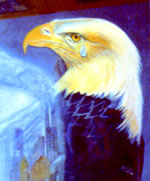 In
all of Sparks’ paintings a sense of personal time is
represented. In each painting there is something of what she
is feeling or experiencing in the moment, which fixes each
artwork on an historical continuum. On one level, she uses
her art to express poignant events in her life, such as, her
watercolor painting of September 11th, which she painted in
one night in response to the tragedy. September 11th shows
the majestic bald eagle with his symbolic tear over a smoking
World Trade Center. Sparks painted this image as a way of
grappling with the magnitude of the tragedy experienced by
so many American families. In
all of Sparks’ paintings a sense of personal time is
represented. In each painting there is something of what she
is feeling or experiencing in the moment, which fixes each
artwork on an historical continuum. On one level, she uses
her art to express poignant events in her life, such as, her
watercolor painting of September 11th, which she painted in
one night in response to the tragedy. September 11th shows
the majestic bald eagle with his symbolic tear over a smoking
World Trade Center. Sparks painted this image as a way of
grappling with the magnitude of the tragedy experienced by
so many American families.
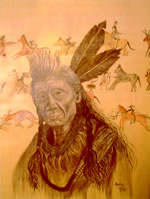 On
another level, Sparks also uses her painting to process significant
dreams and ideas that come to her begging for further inquiry.
For example, Memories of Many Hunting Seasons is an oil portrait
of a Medicine Man that came to Sparks in her dreams. The Medicine
Man’s gaze is fixed on the viewer, as he is silently
conveying his story through his eyes. He is not merely symbolic
of the Medicine Man or the Warrior; he is a real apparition,
a being of flesh, memory, and experience. His humanness is
expressed in his character— his wrinkles, his clothing,
his hair and, especially, his eyes. In contrast, he is painted
in a ghostly black and white with very subtle coloration;
and his torso fades into space. In this way, he is like a
memory himself: interesting, profound, defined by life’s
events, but forever intangible. On
another level, Sparks also uses her painting to process significant
dreams and ideas that come to her begging for further inquiry.
For example, Memories of Many Hunting Seasons is an oil portrait
of a Medicine Man that came to Sparks in her dreams. The Medicine
Man’s gaze is fixed on the viewer, as he is silently
conveying his story through his eyes. He is not merely symbolic
of the Medicine Man or the Warrior; he is a real apparition,
a being of flesh, memory, and experience. His humanness is
expressed in his character— his wrinkles, his clothing,
his hair and, especially, his eyes. In contrast, he is painted
in a ghostly black and white with very subtle coloration;
and his torso fades into space. In this way, he is like a
memory himself: interesting, profound, defined by life’s
events, but forever intangible.
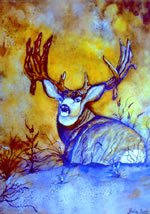 The
background of Memories of Many Hunting Seasons shows the rhythmic
pattern of simplified horse and rider figures, imagery which
echoes late 19th Century Sioux teepee paintings. The background
figures move like a procession of memories contained in the
life experiences of the Medicine Man. The
background of Memories of Many Hunting Seasons shows the rhythmic
pattern of simplified horse and rider figures, imagery which
echoes late 19th Century Sioux teepee paintings. The background
figures move like a procession of memories contained in the
life experiences of the Medicine Man.
Sparks has done a large series of Native American portraits
and imagery, which were part of an exploration of her own
Cherokee heritage. She expressed to me these particular paintings
were a means of gathering up historical (and perhaps spiritual)
information that she found to be timely wisdom for her life.
Sparks is a fourth generation Moabite. She is frequently asked
why she has not left Moab to move to a bigger town. She answers
with the fact that she is smart enough to recognize how great
the town of Moab is. In addition, she has very fulfilling
life with her family and with her job as the Manager of the
Red Stone Inn (of which it is her 10th season).
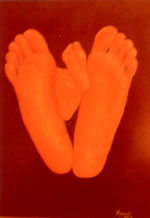 Sparks
creates further contentment and fulfillment in her life by
focussing on the positive and finding joy in the little moments.
These “little moments” often become the subject
of her paintings. For example, Mother’s and Baby’s
Feet in watercolor is a literal representation of a “little
moment” between mother and child. However, symbolically
the painting expresses a piece of the human story: our genetic
heritage, the lifelong connection between mother and child,
and the individual paths and choices we choose. In looking
at Mother’s and Baby’s Feet, I was moved by the
way that the delicate baby’s feet are cradled in the
larger, stronger mother’s feet. Again I am brought back
to thinking about Divine support and guidance. We are the
baby in this image, and we are supported and protected by
a benevolent force, which loves and nurtures us with a capacity
we simply cannot fathom. Sparks
creates further contentment and fulfillment in her life by
focussing on the positive and finding joy in the little moments.
These “little moments” often become the subject
of her paintings. For example, Mother’s and Baby’s
Feet in watercolor is a literal representation of a “little
moment” between mother and child. However, symbolically
the painting expresses a piece of the human story: our genetic
heritage, the lifelong connection between mother and child,
and the individual paths and choices we choose. In looking
at Mother’s and Baby’s Feet, I was moved by the
way that the delicate baby’s feet are cradled in the
larger, stronger mother’s feet. Again I am brought back
to thinking about Divine support and guidance. We are the
baby in this image, and we are supported and protected by
a benevolent force, which loves and nurtures us with a capacity
we simply cannot fathom.
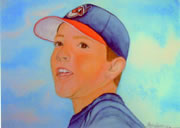 I
want to conclude this article with my thoughts on the way
in which Sparks represents Divinity in human terms. What really
grabs me about her “human interest” paintings is
that a relationship between the human and the Divine is made
clear. Sparks does not paint godly subjects that are seemingly
unattainable in our daily human struggle. But rather, she
paints, in very human and accessible terms, the soul and its
manifestation in the apparently mundane. Rather than depreciating
the Divine, her work exalts the human condition. In this way,
the special little moments and the life altering big moments
are seen in their proper light: with due reverence for the
magic that runs its mysterious course through our daily lives. I
want to conclude this article with my thoughts on the way
in which Sparks represents Divinity in human terms. What really
grabs me about her “human interest” paintings is
that a relationship between the human and the Divine is made
clear. Sparks does not paint godly subjects that are seemingly
unattainable in our daily human struggle. But rather, she
paints, in very human and accessible terms, the soul and its
manifestation in the apparently mundane. Rather than depreciating
the Divine, her work exalts the human condition. In this way,
the special little moments and the life altering big moments
are seen in their proper light: with due reverence for the
magic that runs its mysterious course through our daily lives.
|

 In
all of Sparks’ paintings a sense of personal time is
represented. In each painting there is something of what she
is feeling or experiencing in the moment, which fixes each
artwork on an historical continuum. On one level, she uses
her art to express poignant events in her life, such as, her
watercolor painting of September 11th, which she painted in
one night in response to the tragedy. September 11th shows
the majestic bald eagle with his symbolic tear over a smoking
World Trade Center. Sparks painted this image as a way of
grappling with the magnitude of the tragedy experienced by
so many American families.
In
all of Sparks’ paintings a sense of personal time is
represented. In each painting there is something of what she
is feeling or experiencing in the moment, which fixes each
artwork on an historical continuum. On one level, she uses
her art to express poignant events in her life, such as, her
watercolor painting of September 11th, which she painted in
one night in response to the tragedy. September 11th shows
the majestic bald eagle with his symbolic tear over a smoking
World Trade Center. Sparks painted this image as a way of
grappling with the magnitude of the tragedy experienced by
so many American families. On
another level, Sparks also uses her painting to process significant
dreams and ideas that come to her begging for further inquiry.
For example, Memories of Many Hunting Seasons is an oil portrait
of a Medicine Man that came to Sparks in her dreams. The Medicine
Man’s gaze is fixed on the viewer, as he is silently
conveying his story through his eyes. He is not merely symbolic
of the Medicine Man or the Warrior; he is a real apparition,
a being of flesh, memory, and experience. His humanness is
expressed in his character— his wrinkles, his clothing,
his hair and, especially, his eyes. In contrast, he is painted
in a ghostly black and white with very subtle coloration;
and his torso fades into space. In this way, he is like a
memory himself: interesting, profound, defined by life’s
events, but forever intangible.
On
another level, Sparks also uses her painting to process significant
dreams and ideas that come to her begging for further inquiry.
For example, Memories of Many Hunting Seasons is an oil portrait
of a Medicine Man that came to Sparks in her dreams. The Medicine
Man’s gaze is fixed on the viewer, as he is silently
conveying his story through his eyes. He is not merely symbolic
of the Medicine Man or the Warrior; he is a real apparition,
a being of flesh, memory, and experience. His humanness is
expressed in his character— his wrinkles, his clothing,
his hair and, especially, his eyes. In contrast, he is painted
in a ghostly black and white with very subtle coloration;
and his torso fades into space. In this way, he is like a
memory himself: interesting, profound, defined by life’s
events, but forever intangible. The
background of Memories of Many Hunting Seasons shows the rhythmic
pattern of simplified horse and rider figures, imagery which
echoes late 19th Century Sioux teepee paintings. The background
figures move like a procession of memories contained in the
life experiences of the Medicine Man.
The
background of Memories of Many Hunting Seasons shows the rhythmic
pattern of simplified horse and rider figures, imagery which
echoes late 19th Century Sioux teepee paintings. The background
figures move like a procession of memories contained in the
life experiences of the Medicine Man. Sparks
creates further contentment and fulfillment in her life by
focussing on the positive and finding joy in the little moments.
These “little moments” often become the subject
of her paintings. For example, Mother’s and Baby’s
Feet in watercolor is a literal representation of a “little
moment” between mother and child. However, symbolically
the painting expresses a piece of the human story: our genetic
heritage, the lifelong connection between mother and child,
and the individual paths and choices we choose. In looking
at Mother’s and Baby’s Feet, I was moved by the
way that the delicate baby’s feet are cradled in the
larger, stronger mother’s feet. Again I am brought back
to thinking about Divine support and guidance. We are the
baby in this image, and we are supported and protected by
a benevolent force, which loves and nurtures us with a capacity
we simply cannot fathom.
Sparks
creates further contentment and fulfillment in her life by
focussing on the positive and finding joy in the little moments.
These “little moments” often become the subject
of her paintings. For example, Mother’s and Baby’s
Feet in watercolor is a literal representation of a “little
moment” between mother and child. However, symbolically
the painting expresses a piece of the human story: our genetic
heritage, the lifelong connection between mother and child,
and the individual paths and choices we choose. In looking
at Mother’s and Baby’s Feet, I was moved by the
way that the delicate baby’s feet are cradled in the
larger, stronger mother’s feet. Again I am brought back
to thinking about Divine support and guidance. We are the
baby in this image, and we are supported and protected by
a benevolent force, which loves and nurtures us with a capacity
we simply cannot fathom. I
want to conclude this article with my thoughts on the way
in which Sparks represents Divinity in human terms. What really
grabs me about her “human interest” paintings is
that a relationship between the human and the Divine is made
clear. Sparks does not paint godly subjects that are seemingly
unattainable in our daily human struggle. But rather, she
paints, in very human and accessible terms, the soul and its
manifestation in the apparently mundane. Rather than depreciating
the Divine, her work exalts the human condition. In this way,
the special little moments and the life altering big moments
are seen in their proper light: with due reverence for the
magic that runs its mysterious course through our daily lives.
I
want to conclude this article with my thoughts on the way
in which Sparks represents Divinity in human terms. What really
grabs me about her “human interest” paintings is
that a relationship between the human and the Divine is made
clear. Sparks does not paint godly subjects that are seemingly
unattainable in our daily human struggle. But rather, she
paints, in very human and accessible terms, the soul and its
manifestation in the apparently mundane. Rather than depreciating
the Divine, her work exalts the human condition. In this way,
the special little moments and the life altering big moments
are seen in their proper light: with due reverence for the
magic that runs its mysterious course through our daily lives.